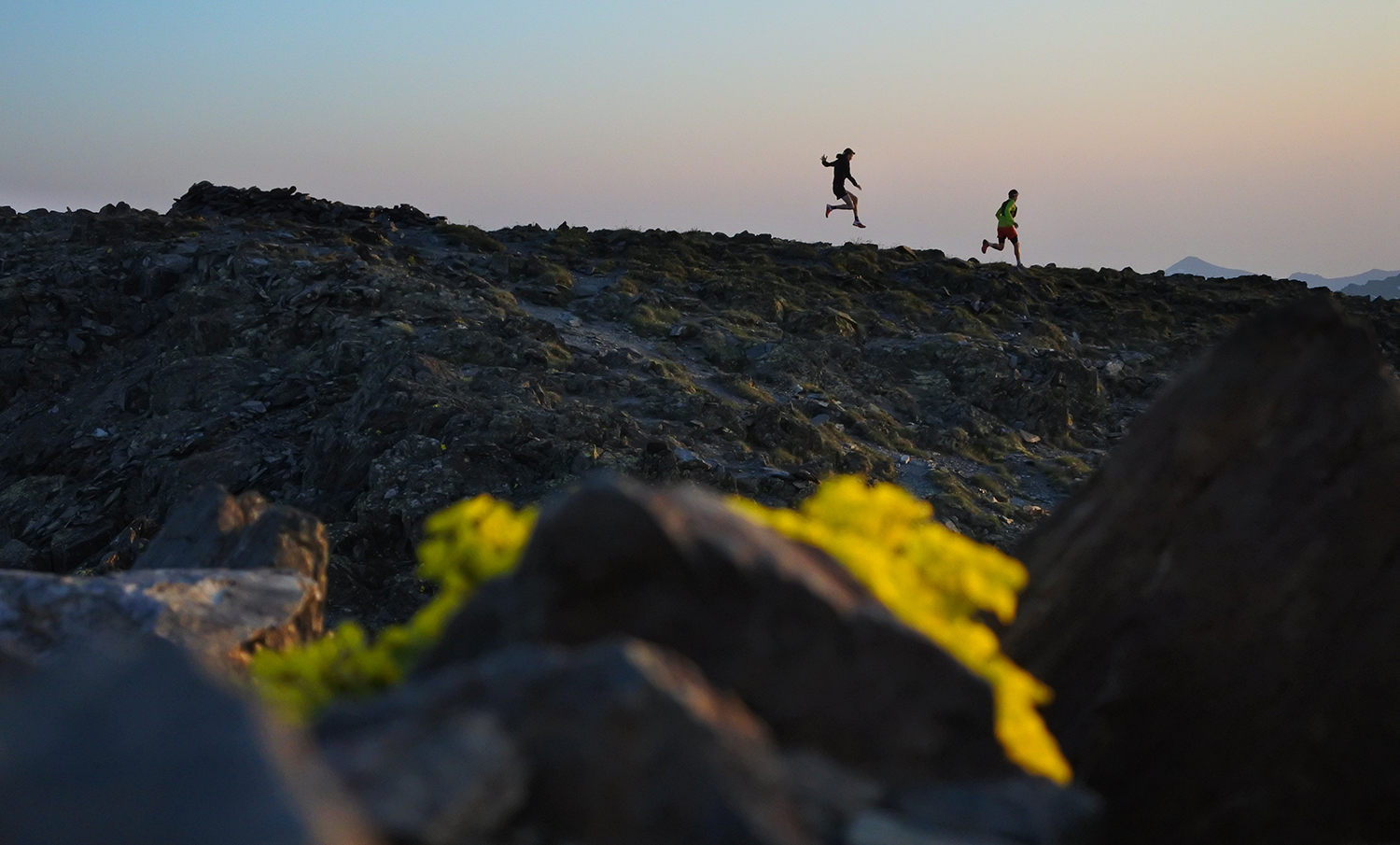The sun barely starts to set as I climb up a muddy and well-worn trail in the coastal mountains of Oregon. I am 40 miles into my 100-mile race and have a long night ahead of me. I check in on myself: “Feeling good, Alexa. Keep grinding. You know these trails better than anyone.”
The moment I finish this thought, I feel a sudden, sharp pain in my right knee. I stumble to the ground in pain. Trying to stand, I realize in horror that I can barely weight that leg. I was 5 miles out from the next aid station, where my crew is waiting to assist me. I sit on the wet branches and bushes lining the trail and take a deep breath. Breath. Plan. Act. This is where I am, and nothing can change the circumstances. Instead, I have to figure out how to deal with the situation. Remaining calm, I try to stand up but immediately fall. I realize in frustration that I have no choice but to complete the next five miles on a leg that can’t function properly and that my race is over. Tears stream down my face with the knowledge of all the hours of training I put into this, and all my goals are being crushed by small ligaments in my knee.
I defeat this thought by reminding myself of my strength and perseverance. Heck, I trained for 100s of hours on these trails through snow, sleet, and rushing rivers. I can absolutely make it the next 5 miles. It may be slow and painful, but I must do it. Taking a deep breath, I pull myself up and start to limp my way down the trail slowly. I take deep breaths along the way and remember that today was another beautiful day in the woods. This wasn’t going to be my last race.
Ultrarunners receive odd looks when they discuss the 50, 100, or even more miles they run – on purpose. Typical responses include “Like….all at once?” or “Why would you do that? That sounds awful,” or the all-time favorite, “I don’t even like driving that far!”. It begs a good question, why would someone desire to run such painfully long distances? Fortunately, scientists are also curious about it, and studies show that ultrarunners are a little psychologically different from other types of athletes. We can take plenty of lessons from ultrarunners and apply their ultrarunning mindset to our daily life. So, let’s journey through an ultrarunner’s way of dealing with demanding situations through Alexa’s anecdotes and range of experiences as an elite ultrarunning athlete.
Ultrarunners endure extreme athletic fatigue, boredom, gastrointestinal distress, pain, and injury. They run through the day, through the night, through snow, wind, rain, fog, and extreme temperatures and altitudes. What type of brain chemistry allows them to reach these athletic extremes and enjoy it enough to keep doing it?
“Tears stream down my face with the knowledge of all the hours of training I put into this, and all my goals are being crushed by small ligaments in my knee.”
Alexa Hasman

KEY PSYCHOLOGICAL TRAITS OF ULTRARUNNERS
“Every time I sign up for an ultra, I look forward to the struggle. I love the intense feeling of working through tough physical moments. I love being in the woods, alone, and figuring out how to continue when I don’t want to. When I speak to my ultrarunning friends, they often describe that same desire. That need for the struggle and challenge. That is what drives us.”
Alexa Hasman
Scientific studies comparing non-athletes to ultrarunners show some interesting findings. Ultrarunners are more resilient and adaptive and have a lower response rate to negative stimuli (1). They are also lower in affiliative extroversion (not as socially warm and friendly). This may be an essential factor in the long, lonely miles running through the forest alone, but it seems at odds with the close-knit ultrarunning community.
What we can take away from this is that ultrarunning is like a social club for people who don’t enjoy being all that social. A community where people can talk and connect about the lonely sport they love while eating soggy potato chips out of a bowl in the woods. This is our way of connecting when conventional forms of social interaction may be out of our comfort zone.
“Every time I sign up for an ultra, I look forward to the struggle. I love the intense feeling of working through tough physical moments. I love being in the woods, alone, and figuring out how to continue when I don’t want to. When I speak to my ultrarunning friends, they often describe that same desire. That need for the struggle and challenge. That is what drives us.”

One study finds that ultra-endurance athletes score higher than an average person on openness to risk and experience-seeking (2). One glance into the inner world of the ultrarunning athlete and these traits track pretty well. The study proves that participants in an ultra-event tend to choose activities with danger and risk.
Surprisingly, the same study also shows ultra-athletes score lower than the average person on disinhibition. They tend to avoid drugs, alcohol, and other agents they perceive may negatively impact their performance.
“I start to place the delicious-looking aid station pancake in my mouth. It’s 5 am, and the sun is starting to rise. I should be crossing the finish line in an hour or so. Instead, I am 20 miles out and about to start puking uncontrollably. This is not the day I wish for. I have to pull off the trail to rest. I am not feeling good, and I am moving slowly. As I start biting down on the pancake, I vomit all over the high desert trail of Oregon. I question myself about continuing in these circumstances. I would finish much later, if at all than I planned for. I can’t keep food in, and I saw safari animals and ghosts on every tree. But then again, I am here and 80 miles in. Why stop now? Why not see if I can finish and conquer this race despite the grueling circumstances.”
Ultrarunners score low on the boredom susceptibility scale (3). This makes sense, considering hours spent running alone in the forest takes a certain amount of ability to self-entertain. Still, another fascinating study in the Journal of Pain tests the pain tolerance of ultra-endurance athletes. It found that ultrarunners score 40% lower on the Pain Anxiety Symptom Scale than the average population. The author hypothesizes that ultrarunners using pain interventions and avoidance techniques means that they are better equipped to deal with pain due to how they handle it mentally, not that they physically have a higher pain tolerance (4).
Working with these characteristics, we can hone our skills to improve our craft. This means spending time honing our pain tolerance skills with breathing techniques and reminding ourselves that we are ok (in situations where the pain isn’t harmful or dangerous). Understanding these traits also helps us recognize why we, as ultrarunners, might be different and why our hobbies seem odd to the average person.

NON-ULTRARUNNERS’ PERSPECTIVE
It’s worth asking how ultrarunners compare to non-athletes and fellow athletes of other sports. Here, we see vital differences as well. When comparing them to short-distance runners, ultrarunners are more neurotic, the study assesses. However, they also experience more flow in their running due to the time spent running in nature (5).
“Most often, when speaking to anyone that doesn’t run ultras, they reply with, “That sounds terrible. I would never do that. Why do you want to run that far?” My thoughts are, “Why wouldn’t you?” Why wouldn’t you want to work towards a goal that seems maddeningly impossible? A goal that scares you and makes people’s jaws drop. Why wouldn’t you want to explore the depths of your abilities and see the incredible beauty of our planet in such a vulnerable and unique way.”
Many studies find that ultra-endurance athletes have more drive to explore their mental and physical limits than athletes in other sports (6). They also have more persistence, drive, and motivation (7). The most significant factor is the difference in motivation levels between endurance athletes and ultra-endurance athletes, highlighting that the latter scores higher on this trait.
This helps us understand why we look for the next hard event and how and why we can push ourselves out of our comfort zone. We can also conceptualize our ability to persist and continue when most would not. Finally, we can see that our motivation is what inevitably drives us, so it is important to examine and contemplate what our motivations are.
ULTRARUNNERS’ SOURCE OF MOTIVATION
“I always tell my athletes that many of their training runs aren’t going to be rainbows and butterflies. They are hard, relentless, and unforgiving. You will question why you are doing this and consider giving up. That’s when you remind yourself WHY you are doing what you are doing. How will it feel when you cross the finish line, get to the top of that big climb, and taste that pancake at the aid station at mile 80? How will the hugs feel at the end of the race? How will the world feel? Will you feel different? Yes, you will! And you will earn that feeling through these relentless and unglamorous training miles,” explains coach Alexa.
The science of motivation is intriguing. When it comes to ultrarunners, studies show achieving personal goals motivates them (8). Motivation for these goals is intrinsic rather than impressing other people with their athletic feats. They try to show themselves that they can do it. This significantly differs from other endurance sports participants, such as marathoners, whose motivation is driven by health and self-esteem. A study that directly compares what motivates ultrarunners versus full and half marathoners shows that health and weight are of lesser concern to ultrarunners, but life meaning and affiliation propel them (9). Shockingly, 74.1% of ultrarunners reported that they would not stop running ultras if they found out it was bad for their health (10). They rationalize this by saying that running fulfills their sense of achievement and psychological needs.
Ultrarunners often look for their next goal race or more challenging terrain. It is what keeps them going. It is not about proving to others (although it makes for a good story over a coffee). Having a clear goal and realistic expectations of yourself helps in your preparations. Ultrarunners are aware that it will be difficult, but it will also change them as a person and their outlook toward situation handling.
74.1% of ultrarunners reported that they would not stop running ultras if they found out it was bad for their health.

GRIT - A KEY INGREDIENT IN AN ULTRARUNNER’S RECIPE
The topic of mental toughness is unavoidable when discussing ultrarunning. Undoubtedly, ultrarunning demands extreme mental toughness, but what is that? And do ultrarunners have more of it?
“At 6 am on a dusty trail in Arizona, I watch the racers pull away. Slowly they disappear into the distance, and as I look around, I find myself all alone. It is my first 100-mile race, and I suddenly question everything. Why am I so far behind? Am I THAT bad? How is this possible? My mind races as I figure out what I am doing wrong. I look down at my watch and realize I am moving just fine. I discern that I need to get my mind under control. I take a deep breath and remember to run my race. I should not worry about anyone else. I have no control over any runners, so why worry about them? All I can do is remain calm, breathe, and focus on myself and how I feel. Eventually, those runners would come back to me. By mile 60, I move up to the first place female and 8th overall. By working on my race and mentality, I overcome the demons of self-doubt and fear. I would not be in the place I am, at mile 60, if I worry about other racers. It leads to me burning out and likely a DNF.”
In one study, researchers glean from ultrarunners’ interviews that “mental toughness in ultramarathon running is the ability to persist and utilize mental skills to overcome the perception of physical, psychological, emotional, and environmental obstacles in the relentless pursuit of a goal (11).” The study further determines that mental toughness helps athletes overcome physical and psychological distress, allowing them to maintain emotional control and stay positive in adverse situations.
IDEAS FOR DEVELOPING GRIT AND MENTAL TOUGHNESS
- Work through the tough spots in training. There will always be a training day that is more difficult than others. Instead of throwing in the towel, sit with that discomfort and continue past it.
- Assess what is hard now and take a second to breathe to ask yourself how you can overcome this situation.
- Consciously observe your feelings. Change negative thoughts into positive ones. Instead of saying, “I can’t do this,” take a moment and rephrase it. “This is hard, and I am struggling. I am going to walk for a bit and see if I feel better. I know that usually, I feel better doing this”. Remember not to show weakness to your mind.
- Remind yourself of your training and when you last completed something hard or something you didn’t think you could accomplish. It’s motivating and instills confidence in you.
It also just so happens that the number one predictor of success in life is grit. Watch this incredible TED talk from Angela Duckworth – Grit: The power of passion and perseverance.
“As we taper, we start to doubt ourselves. Did I run enough? Did I climb enough? Do I even know how to use my poles? Wait, am I sure I like Tailwind? Your palms get sweaty as you look at the elevation map of your race, remembering that you have a lot of verticals across many miles. Is it even possible? Fear and self-doubt are normal and will be beneficial as you line up on race day. Without that emotional response, we wouldn’t have the drive and purpose behind our actions.”

LESSONS TO LEARN FROM ULTRARUNNERS
“Ultrarunning teaches us a lot. It teaches us patience, grit, determination, and how to handle situations when they don’t go as planned. We can apply these lessons to life. Everyday life doesn’t go as per plan; how we choose to handle it matters. What we do on the trail influences how we deal with stuff in the real world, with patience, grit, determination, and adaptability.”
Ultrarunners are persistent, committed, and motivated, which helps them keep running even after the point of zombie hallucinations and conversations with trees. The sense of achievement of something rare and incredible pushes them, and running a distance, most people don’t even like to drive. All these characteristics make incredible, determined, and massively impressive athletes that are psychologically just a little different than the average person, but in all the best ways.
SUMMARY
One can take many of the lessons of ultrarunning and apply them to pressing situations in their life. Every problem can be dealt with when broken into smaller pieces, and emotional stability provides a clear vision, etc. It teaches us patience, grit, determination, and how to handle situations when they don’t go as planned. Breath-Plan-Act is always a good plan. We can apply these and many other lessons to life. Everyday life doesn’t go as planned; how we choose to handle it matters, and what we do on the trail influences how we deal with stuff in the real world – with patience, grit, determination, and adaptability.
Check out the author’s bio page here.
REFERENCES
- Gregory S. Roebuck, D. M. (2020). Psychological characteristics associated with ultra‐marathon running: An exploratory self‐report and psychophysiological study. Australian Journal of Psychology, 72(3), 235-247.
- Sherri Lind, H. C. (2003). Personality Profiles of Iditasport Ultra-Marathon Participants. Journal of Applied Sport Psychology, 15(3), 256–261.
- Hoffman, M. D. (2018). Ultra-obligatory running among ultramarathon runners. Research in Sports Medicine, 26(2), 211–221.
- Gregory S. Roebuck, D. M. (2018). Psychological Factors Associated With Ultramarathon Runners’ Supranormal Pain Tolerance: A Pilot Study. 19(12), 1406-1415.
- Martinez, C. T. (2016). Trail and Ultrarunning: The Impact of Distance, Nature, and Personality on Flow and Well-Being. Psi Chi Journal of Psychological Research, 21(1), 6–15.
- Gregory S. Roebuck, P. B.-K. (2018). The psychology of ultra-marathon runners: A systematic review. Psychology of Sport and Exercise, 37, 43-58.
- Differences in psychological skills in ultra-endurance athletes and endurance athletes. (2022). Sport Journal.
- Gregory S. Roebuck, P. B.-K. (2018). The psychology of ultra-marathon runners: A systematic review. Psychology of Sport and Exercise, 37, 43-58.
- Hanson, N. M. (2015). Motivational differences between half, full, and ultramarathoners. Journal of Sport Behavior, 38(2), 180–191.
- Hoffman, M. D. (2018). Ultra-obligatory running among ultramarathon runners. Research in Sports Medicine, 26(2), 211–221.
- Jaeschke, A.-M. C. (2016). Ultramarathon Runners’ Perceptions of Mental Toughness: A Qualitative Inquiry. Sport Psychologist, 30(3), 242–255.

